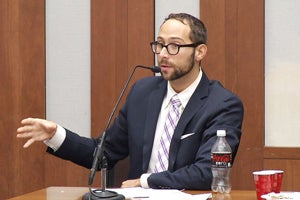Two pieces that appeared recently in The New York Times claim that law schools are in a state of “crisis.” The first, by journalist David Segal published on Nov. 19, suggests that law schools aren’t teaching students what they need to know to practice in the real world. The second, an editorial published on Nov. 25, noted that law schools leave students with crushing student loans and bleak job prospects.
On Feb. 2, three law professors addressed the questions brought up by these stories, in a panel titled “Are Law Schools in Crisis? The New York Times Editorial and its Discontents.” The panel was hosted at Harvard Law School. While all agreed that law schools indeed face challenges—including rising tuition costs, shrinking job markets and calls for more practice and less theory—none believed that a state of crisis exists.
HLS Assistant Professor Glenn Cohen ’03, co-director of the Petrie-Flom Center for Health Law Policy, Biotechnology, and Bioethics, stated that author David Segal got many points wrong and several points right: “Essentially he doesn’t understand the way in which ideas translate into the real world.” Cohen conceded that the price of legal education was very high on a per-person basis, but disagreed that the legal education system fails its students.
Peer Zumbansen LL.M. ’98 (below, far right), professor of law at York University in Toronto, addressed the academic system as a whole, emphasizing that one cannot separate issues in law schools from issues in higher education. When it comes to law schools in particular, he suggested cutting down on the number of courses offered at many schools (some offer as many as 400) and requiring new and tenured professors alike to defend their course offerings in order to maintain quality. “That practice would, of course, rattle the cage,” Zumbansen said.
Alfred C. Aman Jr. (right, with Zumbansen), professor of law at Indiana University, said law schools should develop a transnational curriculum that applies to students from around the world, predicting a future influx of law students from abroad.
He also spoke more broadly about legal education. “You take people where they start, and not everyone starts at the same place. So I think one has to be focused more on the substance and opportunity, and diversity and ideas and critique. It sounds very academic but I think it’s also very practical.”
Zumbansen noted that the question of practicality in law schools is not a new issue. “I don’t know what to make of the fact that after a hundred years … we still come back to the same issues.”
The event, which was organized by the Harvard Law School S.J.D. Association was co-sponsored by the Harvard Law School Graduate Program and the Canada Program at the Weatherhead Center for International Affairs. The event was part of a series of seminars entitled “Mapping the Globalization of Legal Education”, designed as a lead up to the Global Legal Education Forum, to be held at HLS from March 23-25, 2012..
